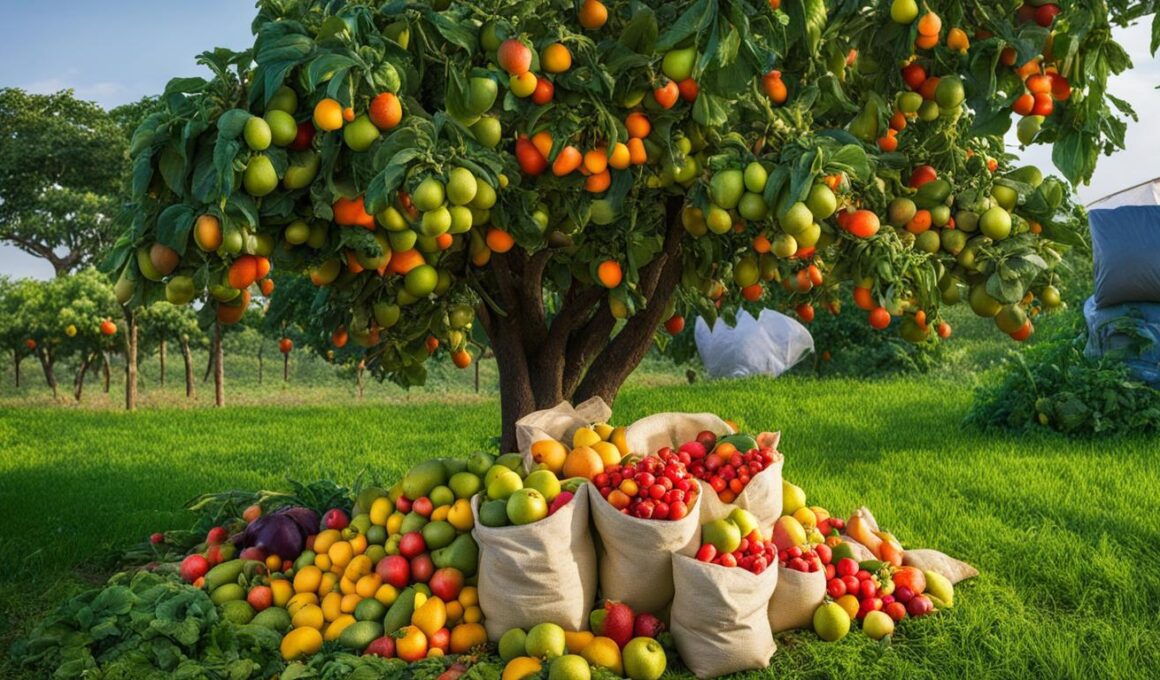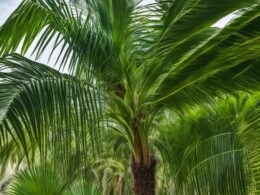Fruit trees require proper nutrition to grow and produce a bountiful harvest. Knowing when and how to fertilize your fruit trees is essential for their health and productivity. Fertilizing should be done in the early spring, just before bud break, and nitrogen application should stop after July.
Measuring the previous year’s growth can help determine the fertilizer needs of your fruit trees. Different types of fruit trees have different growth rates, so it’s important to calculate the average growth for each tree.
Choosing the right fertilizer for your fruit trees is crucial, and organic fertilizers, such as blood meal and composted chicken manure, are highly recommended. The amount of fertilizer to use depends on the age or size of the tree, and the nitrogen-value on the package.
Fertilizer should be applied evenly around the drip line of the tree, and a layer of compost should be spread around the tree after fertilization.
When and How to Fertilize New Fruit Trees
Fertilizing new fruit trees is crucial for their healthy growth and establishment. Timing and technique are essential for successful fertilization. Here’s what you need to know about fertilizing young fruit trees:
The Best Time to Fertilize
The ideal time to fertilize new fruit trees is in the spring, after the buds have started to break. This is when the tree is actively growing and can efficiently utilize the nutrients from the fertilizer. It is recommended to complete the fertilization process by July to avoid any potential winter injury.
The Importance of Nutrients
When fertilizing young fruit trees, it’s vital to provide them with the right balance of nutrients. Nitrogen (N) is necessary for promoting green, vegetative growth, while phosphorus (P) and potassium (K) play a crucial role in root development and fruit production.
Choosing the Right Fertilizer
For fertilizing new fruit trees, it is best to use a balanced fertilizer with an ‘N-P-K’ value, such as 10-10-10 or 12-12-12. This ensures that the tree receives adequate amounts of nitrogen, phosphorus, and potassium for overall health and productivity.
Application Methods
There are multiple methods for applying fertilizer to young fruit trees. One approach is to mix the fertilizer with water and apply it as a liquid solution. Another option is to apply fertilizing pellets directly around the drip line of the tree, ensuring even distribution.
Frequency of Application
Different fruit trees may have varying fertilizer requirements, so it’s essential to follow the specific guidelines for each tree variety. Generally, multiple applications throughout the growing season may be necessary to meet the nutritional needs of young fruit trees.
Fertilizing new fruit trees is a critical step towards ensuring their healthy development and future productivity. By fertilizing at the right time and using appropriate techniques, you can provide the necessary nutrients for your young fruit trees to thrive.
Nutrient Needs of Fruit and Nut Trees
Fruit and nut trees have specific nutrient needs throughout their growth stages. One of the most essential nutrients for these trees is nitrogen, as it plays a crucial role in promoting foliage and branch growth. However, it’s important to strike a balance because excessive nitrogen can lead to decreased fruit production and various fruit disorders. Along with nitrogen, phosphorus and potassium are also vital for overall tree health, as they contribute to photosynthesis, water uptake, and plant structure.
When it comes to fertilizing fruit and nut trees, timing is key. Applying nitrogen too early can potentially damage the tree roots, so it’s important to be cautious. Young trees can benefit from early application of phosphorus and potassium, which support their development and strengthen their root system. However, as the trees mature and start bearing fruit, their fertilizer needs change. It is important to understand the specific fertilizer requirements of different types of fruit trees, such as almonds, pistachios, walnuts, and citrus, to ensure optimal growth.
Organic fertilizers, such as pelleted, dry flowable, or liquid forms, are highly recommended for providing the necessary nutrients for fruit and nut trees. These organic options not only fulfill the nutrient needs but also help in maintaining soil health and fertility over the long term. By following the recommended fertilization guidelines and utilizing organic fertilizers, you can create an optimal growth environment for your fruit and nut trees, resulting in thriving and fruitful harvests.









